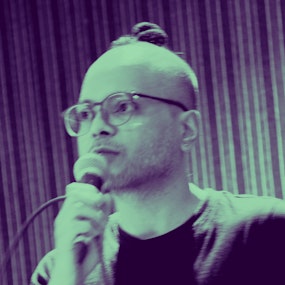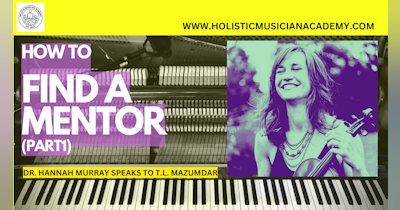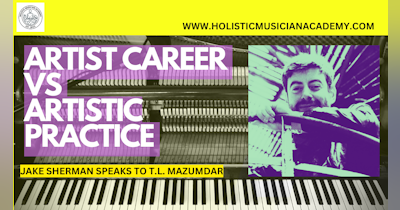(Note: The following is an excerpt from the long-form podcast with Sheila Chandra, ‘Revisting the Birth of World Music and Unpacking its Relevance Today’, which you can listen to here. It's been minimally edited for context with permission).
Introduction:
Sheila Chandra’s career is the stuff legends are made of. Her transition from ''one of the most innovative, provocative singers in any genre'' (Billboard Music) to a celebrated author and artist-coach after health constraints forced her to leave a stunning performing career has earned her a rare brand of respect from peers, the toughest critics and music aficionados all over the globe. This interview excerpt aims to highlight a section of our conversation where we talk about the importance of coaching and support for artists in this day and age.
T.L. : Heres a question from the audience -''Your words of advice to younger artists going through something similar to what you went through. Taking that into account, what would you have done differently? And what would you advise them to do differently?''.
I find this particularly interesting personally too, btw. Some of the students and clients I work with are artists in their early twenties, and a couple have had massive debuts and will tend to feel overwhelmed sometimes, trying to figure out how to take their career forward. Especially in the current (socialmedia-centric) zeitgeist. I mean, that could be a whole podcast episode on its own, but from your personal experiences, if there is the one essential thing, you could tell them to never lose sight of, what would that be?
Sheila : Gosh, that's such a hard question. Because I as you know, I coach artists from around the world. And for me, I can't give one piece of advice. It's a very individual process.
Quite often some artists come to me with a surface problem. They'll say, ''I can't get further than this. I can't get an agent, or I can't get the attention of the label'', or other endeavors they are in the midst of.
And then, when we dig deeper, it's often more of a foundational problem.
T.L. Oh, I'm so with you.
Sheila: Yeah, it can often be a belief mismatch, related to what they believe about themselves.
Or sometimes I'll take a more practical approach. Some may be struggling with, organizational skills or ADHD, or something like that.
So you know....there are as many answers as there are people out there asking that question, unfortunately.
T.L.: I think you did answer the question, though I think. If there are any artists out there who really are overwhelmed, they should seek support. That's how I interpreted that.
Sheila: Yes. I think seeking support in a confidential way from a disinterested person who has the correct and relevant experience to counsel you is very important.
Unfortunately, the nature of the arts (eco-system) is that in any genre, or any medium, there's always a certain 'divide and conquer' energy out there, and the people around you are not necessarily people who know how to or want to give you the best advice.
So chatting it through with someone who is disinterested in the best sense. That would be my advice.
T.L: Yeah. See, even these last few minutes where you just said what you did....that's a bit of a micro masterclass, isn't it? That alone could result in much-needed clarity. Especially for someone who isn't sure where to start looking for answers to some of the questions we just addressed.
I also I feel that in the current ecosystem.....I almost ask myself if trying to build a career as an artist without any form of support is even a negotiable anymore. I wouldn't really recommend it to anyone. To try and build a career completely on your own, the way I tried to, for example, 20 years back...
Sheila: Yeah?
T.L. Yeah. If I were in my 20's today I wouldn't even try to attempt anything remotely similar to what I did, without having some form of a team, support... and yeah, coaching.
Sheila: Yeah, a team in terms of inspiration to bounce off each other.
But also a team in terms of support and coaching. Knowing your rights, and having a legal backup in place. Knowing what you're signing away and what you're not. Confidante's. People who understand, and can talk you through the emotional side of how to balance what is a very strange working life. Sometimes you're working when other people are partying. How to take care of your health as an artist. If you lose your body as an artist, that's it. You can't replace that machinery.
And you're not going to want to stop. If you love it, you're not gonna want to stop when you're 50 or when you're 70, as older artists are proving.
T.L.: Absolutely.
Sheila: So you need to take care of that while you're young and think you're invincible, which of course, you're not. Then there's coping with the psychological elements of working alone on things that other people have no vision for, and only you understand at the beginning of that creative process.
T.L.: Exactly!
Sheila: You need support. And you need people who understand around you who understand those specific struggles. Finding your brand, finding your style, finding your audience.
What's happened in the last 30, 40 years is that where artists used to have a manager who actually managed, record companies that actually promoted them, tour support, record sales that actually amounted to something...you know you think of the profit margins on the physical product as opposed to streaming and downloads)...all that. The weight of all of that has now been put on the artist.
And at a time when we have fewer and fewer curators and larger amounts of work being created. It can be much harder to get noticed and build a following.
On the bright side, I think what is happening is that people are starting to help each other out.
T.L. Collaboration!
Sheila: Yeah, well not just that. They're recommending peers and helping them move forward in their careers. And I think that is the job of more established artists, where possible, to do that.
You see it all the time in the comedy world, for example. I mean, you see Eddie Izzard's friendship with Trevor Noah before he went really huge on The Today Show.
Whoopi Goldberg and Billy Crystal are another example.
Billy Crystal, early on in her comedy career, helped her (Whoopi Goldberg) along and starred alongside her at awards, ceremonies, and things like that... just to help lift her out of an alternative scene, into being thought of as mainstream. Now she was standing up there with mainstream figures, and she was being championed. And if you think about how few black female comics there were of that era, you can see how important that help is.
And so, yeah. Getting that help. Getting that support and getting people to move you on in your career and vice versa.
If you are someone in a privileged position, reaching down and helping the next generation to get to that next stage.
T.L. : Yeah. Couldn't have said it better.
Connect with Sheila:
- Website: https://www.sheilachandra.com/
- Twitter: https://twitter.com/sheila_chandra
- Instagram: https://www.instagram.com/thesheilachandra
- Facebook: https://www.facebook.com/sheila.chandra.1
- YouTube: https://www.youtube.com/@sheilachandra0000
- LinkedIn: https://www.linkedin.com/in/sheilachandraartistcoach/
- Amazon: https://www.amazon.co.uk/Sheila-Chandra/e/B0034Q533Q
- Wikipedia: https://en.wikipedia.org/wiki/Sheila_Chandra
- IMDB: https://www.imdb.com/name/nm1291550/bio/
Download our FREE Practice Planner
Download our FREE Artist Mindmap
Apply for mentorship with T.L.
Have your Professional Artist Bio written



